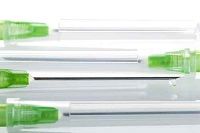Article
Extended Study Confirms Ulcerative Colitis Drug's Safety
Author(s):
Golimumab injections continue to prove effective and safe for patients with moderate-to-severe ulcerative colitis, according to a recent study.

Golimumab injections continue to be effective and safe for patients with moderate-to-severe ulcerative colitis (UC), according to a recent study.
Conducted by Peter Gibson, MD, of the Department of Gastroenterology, at Alfred Hospital, Monash University and Alfred Health in Melbourne, Australia, and colleagues, the study was published in the Journal of Clinical and Translational Gastroenterology on April 28, 2016.
The objective of the study was to determine the efficacy and safety through two years of maintenance therapy for patients receiving subcutaneous golimumab to treat moderate-to-severe UC.
This was a long-term extension (LTE) trial, and participants in the Program of Ulcerative Colitis Research Studies Utilizing an Investigational Treatment-Maintenance (PURSUIT-M) study who had completed treatment through week 52 and evaluations at week 54 were eligible. Patients continued to receive the same therapy of placebo, golimumab 50 or 100 mg that they had been receiving previously, and treatment assignment remained concealed until the main study analyses were completed. At that time, those on a placebo were released from the study.
The Mayo’s physician’s global assessment (PGA) and the inflammatory bowel disease questionnaire (IBDQ) were used to assess efficacy. “At week 54, the proportion of patients with no disease activity was 52.3% and ranged from 53.8 to 58.5% between weeks 56 and 104,” said the researchers. They found that adverse reactions were more common for those receiving 100 mg doses, compared to those receiving 50 mg doses, saying that rates of infections, in particular, did not increase with exposure to golimumab.
Rates of malignancy during the LTE were similar to those during the main study.
One of the goals for the LTE was for patients to maintain inactive or mild disease activity without the use of corticosteroids, and the researchers say, “The majority of patients entered the LTE study with inactive or mild disease and maintained this disease activity through week 104 without corticosteroids.” Additionally, there were no changes regarding the safety of golimumab compared to the main study. The researchers concluded that patients who respond well to golimumab induction therapy and maintain a positive response are likely to continue experiencing controlled disease activity.





